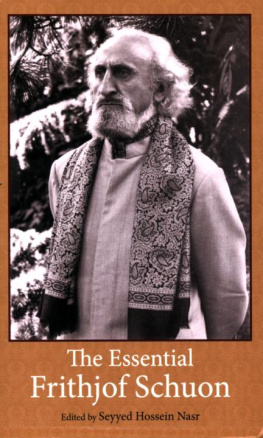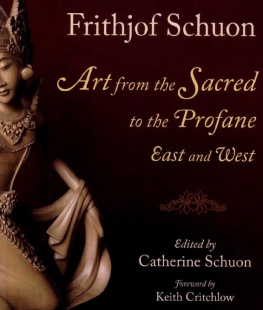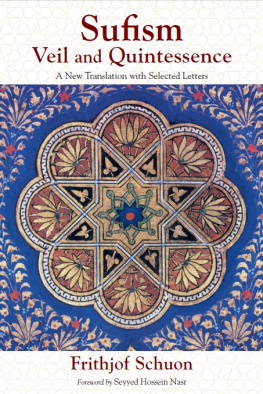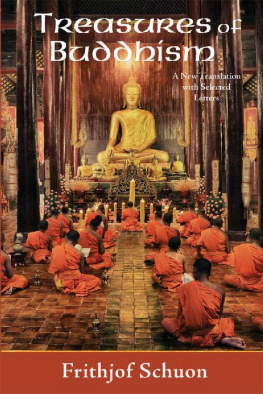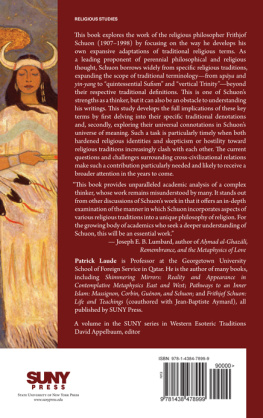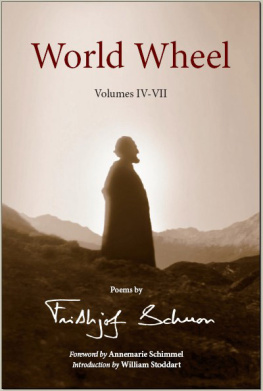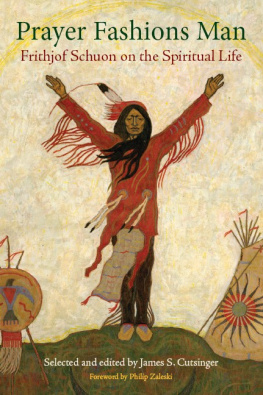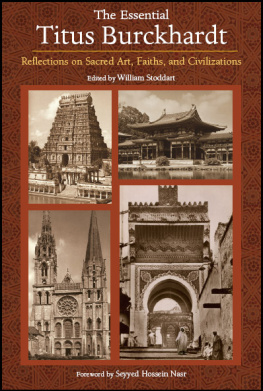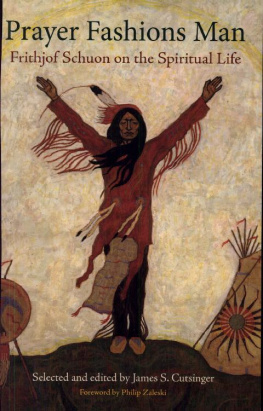The Library of Perennial Philosophy is dedicated to the exposition of the timeless Truth underlying the diverse religions. This Truth, often referred to as the Sophia Perennis-or Perennial Wisdom-finds its expression in the revealed Scriptures as well as in the writings of the great sages and the artistic creations of the traditional worlds.
The Perennial Philosophy provides the intellectual principles capable of explaining both the formal contradictions and the transcendent unity of the great religions.
Ranging from the writings of the great sages of the past to the perennialist authors of our time, each series of our Library has a different focus. As a whole, they express the inner unanimity, transforming radiance, and irreplaceable values of the great spiritual traditions.
The Essential Frithjof Schuon appears as one of our selections in the Writings of Frithjof Schuon series.
The writings V f Frithjof Schuon
The Writings of Frithjof Schuon form the foundation of our library because he is the pre-eminent exponent of the Perennial Philosophy. His work illuminates this perspective in both an essential and comprehensive manner like none other.
Books by Frithjof Schuon
The Transcendent Unity of Religions
Spiritual Perspectives and Human Facts
Gnosis: Divine Wisdom
Language of the Self
Stations of Wisdom
Understanding Islam
Light on the Ancient Worlds
In the Tracks of Buddhism
Treasures of Buddhism
Logic and Transcendence
Esoterism as Principle and as Way
Castes and Races
Sufism: Veil and Quintessence
From the Divine to the Human
Christianity/Islam: Essays on Esoteric Ecumenicism
Survey of Metaphysics and Esoterism
In the Face of the Absolute
The Feathered Sun: Plains Indians in Art and Philosophy
To Have a Center
Roots of the Human Condition
Images of Primordial and Mystic Beauty: Paintings by Frithjof Schuon
Echoes of Perennial Wisdom
The Play of Masks
Road to the Heart: Poems
The Transfiguration of Man
The Eye of the Heart
Songs for a Spiritual Traveler: Selected Poems
Form and Substance in the Religions
Adastra and Stella Maris: Poems by Frithjof Schuon
Edited Writings of Frithjof Schuon
The Essential Writings of Frithjof Schuon, ed. Seyyed Hossein Nasr
The Fullness of God: Frithjof Schuon on Christianity, ed. James S. Cutsinger
Prayer Fashions Man: Frithjof Schuon on the Spiritual Life, ed. James S. Cutsinger
Edited by
Seyyed Hossein Nasr



ix
PAR!' l: RE1-I01oN AND REvEI.AI'1ON
PART II: THE STUDY OF RELIGIONS
PART III: THE NATURE OF REALITY
PART IV: ART AND THE SPIRITUAL SIGNIFICANCE OF BEAUTY
PART V. MAN
PART VI: THE SPIRITUAL LIFE
PART VII: ESCHATOLOGY AND THE AFTERLIFE.
PART VIII: CRITICISM OF THE MODERN WORLD
PART IX: SPIRITUAL IMPRESSIONS
THIS ANTHOLOGY OF THE WRITINGS of Frithjof Schuon was prepared in the mid 1980s over a decade before his death in 1998. With the remarkable creativity that he possessed, he continued to write up to nearly the very end of his earthly existence. One might, therefore, think that a new version of The Essential Writings of Frithjof Schuon should include new selections from his later works written during the last dozen years of his life. But there are several reasons why we have decided to preserve the original selections.
First of all, the present anthology was sent to Schuon himself and after several discussions and exchanges, was finalized in its present form with his own definitive approval. He mentioned to us that what we had selected did indeed represent the "essential" Schuon, even if because of limitations of space one could not have included all that we ourselves considered to be essential. In any case both the selections and the introduction to this work had his firm confirmation and imprimatur.
Secondly, the wonderful prose works that Schuon produced during the last years of his life were mostly syntheses, reformulations, and summaries of what he had expounded in his magisterial writings over a fifty-year period preceding the publication of our anthology. When we discussed this matter with the author himself, he confirmed this appraisal, adding that there were a few works such as the essay "To Have a Center" in which he had embarked upon a new subject, but that for the most part his later works had the function of further clarifying and synthesizing his earlier writings. As for the large amount of poems written by Schuon at the end of his life, they in a sense summarize in poetic medium the whole corpus of his teachings. Already, a selection of those poems has been published and one hopes that others will follow. But in any case there is such a large body of this later poetry that one cannot do justice to it by simply adding a few of these poems to this volume.
The few poems originally included in this volume represent something quite different: they are selections from two small volumes of poetry written by Schuon in his earlier years and they were included with Schuon's approval to demonstrate his poetic gifts and the spiritual nature of those early poems. These early volumes of poetry are like brooks of clear running water flowing from some mountain spring. The late poems are vast in number and more like an ocean of which an anthology could not be made by including just a few examples. One hopes that, first of all, the whole collection of these later poems-almost all of which are in German-will be published in the original language; secondly, that the whole corpus will then be translated and published in English; and, thirdly, that a separate anthology will be made of these late poems in their English translation, along with samples of the few poems Schuon wrote in English during the last years of his life.
Finally, it is necessary to remember that the present anthology was in print for many years and is seen by many readers interested in the works of Schuon to be a good place of entry into that vast intellectual and spiritual world. We therefore thought it best to preserve it in its present form rather than creating basically a new anthology by incorporating material written by Schuon after The Essential Writings of'Frithjof Schuon appeared. Our hope is that others will come forward to publish new anthologies of his writings in general. As for anthologies concerned with specific subjects, that project is in fact fortunately proceeding forth already under the auspices of World Wisdom.

